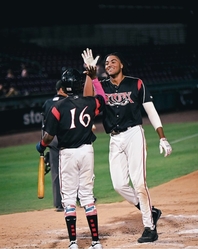(Long post) For the past two years my son has mentored 15 young black baseball players from around the country. They have zoom calls and stay in touch via text/social media. They range from 10 years old to a sophomore Alabama commit. Yesterday, he had a call with the boys and invited one of his minor league teammates. They played together in low A before James got traded and Justin got promoted to high A. They shared experiences of getting drafted out of HS (James) vs. committing to a Florida as a 14 year old then transferring to a JUCO and finishing at FIU (Justin). They talked openly with the boys and shared some gems that reflect a lot of what we discuss here but I thought I’d share it with you:
Q: If you could tell your younger self something that you wish you knew then, what would it be?
A: Don’t care so much what other people think and say. And especially don’t focus on rankings. A lot of so called experts are just guessing too.
Q: What would your advice be around failure? And success?
A1: Baseball is all about failure. When I take off my batting helmet to put my hat on for defense or vis-a-versa, that is my physical cue to put whatever happened in the previous half inning behind me. You also can’t let successes get you too high because baseball will humble you. I always have one teammate who helps keep me honest.
A2: (NB: he was below the Mendoza line for the first month and a half of the season) I’d rather fail early than only have success. Failure helps identify weaknesses in your approach or your fundamentals and you can address those to improve. Without that failure, you might not have known you need to make those adjustments. Also, it’s a long season. You will go crazy if you freak out about every at bat.
Q: What are you focusing on this off-season?
A1: Working a lot on strength and flexibility. This includes Pilates and yoga in addition to regular speed and agility and hitting. I’m especially working on getting my hips looser. I wanted to gain more muscle to add some power but after I got over 220 I went into the cages and didn’t like how my swing felt and realized that I had put on too much mass and needed to scale back.
A2: I’ve been focusing on defense and putting good weight on. I lost almost 20 pounds during the season so that’s something I need to address. I didn’t pick up a bat for a couple of weeks and am working into getting swinging reps now.
Q: Do you do any forearm work?
A (both): Big emphasis for both of them. They both spend 10-15 minutes or even more every work out day doing exercises to strengthen their forearms.
Q: Tell me something you learned from each other.
A (also together): We had a streak of about 15 games where once I got on base (friend), he got on base (PTWoodson). He protected me (friend to son), and I watched his at bat and learned about the pitcher watching his AB (son to friend). You can learn so much and even get tells from the pitcher if you watch every at bat, especially from the batters circle. I spend most of my dugout time right at the entrance close to the coaches learning as much as I can about the pitcher first but also the catcher. (NB: last year in 202 minor league games—126 for one and 76 for the other—they stole 60 bases)
Q: What are the main differences at the different levels (SEC, JUCO, mid major, complex league, low A, high A)?
A: Depth of pitching is the biggest differentiator in college. Plus the number of dudes at every position. Surprisingly, Low A to high A, the biggest difference to me is defense. Balls aren’t getting through the gap. You can’t get stretch doubles. The pitching is a little better but the defense is what really matters.
Q: Did you play other sports in HS?
A1: Basketball. I think it really helped me stay athletic. I wish I had also run track.
A2: Football. It was actually my primary sport until about my sophomore year. I also ran track for a season but it was awful. I thought if you ran the 100 you just run the 100 but it’s not like that!
Q: What is a good FB velocity for an 8th grader.
A: No clue but I do believe several of my friends ended up with TJ chasing velocity. Focus on location, mechanics, your body and velocity will come.
Closing thoughts…
(Together) There are a lot of ways to realize your dreams. JUCO is a great option and there are some real dogs in JUCO. Don’t compare your journey to someone else’s. It will just drive you crazy. Minimize your social media both what you read and what you post. And baseball is so hard that you have to focus on what you put into it more than the outcomes. Use the outcomes to inform the work you put in.
The boys also asked for them to share some fielding drills, there was a lot of “favorite bat” talk and some video game talk. Then we had to go cause big sis had a game!! :-)
I hope someone finds this useful.


